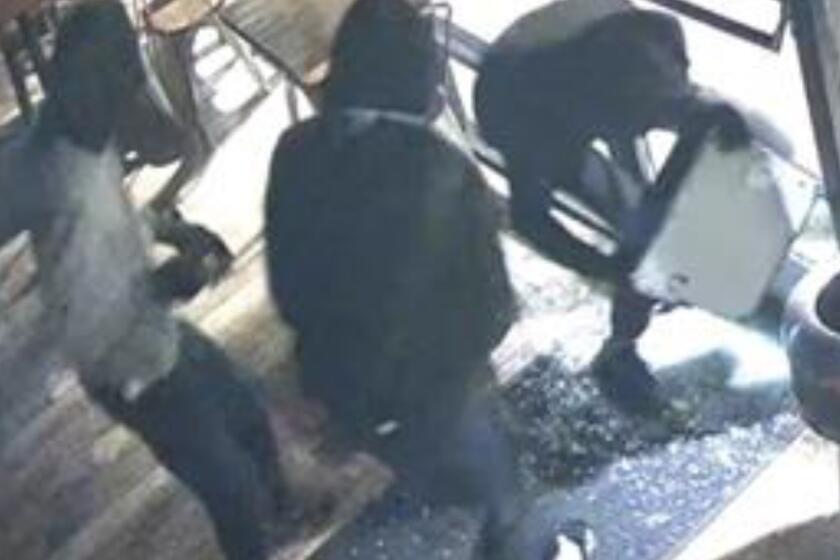Audit: State wasted cash in Pasadena
California transportation officials have spent millions of dollars making overpriced, unjustified repairs to houses the state owns in and around Pasadena, according to an audit released Thursday.
Caltrans bought the houses decades ago to bulldoze for the long-planned, never built extension of the 710 Freeway. The agency has spent $22.5 million since 2008 to maintain the homes, but transportation officials are “unable to demonstrate that the repairs were necessary, reasonable or cost-effective,” according to the report by the California State Auditor, which was sparked by a Times investigation.
The state is also losing $22 million per year because tenants, including 15 state employees, are paying far below market rates for rent. Other homes, some of which have been recognized as historical landmarks, have been boarded up and empty for years.
For one of those vacant houses, state officials recently estimated that it should have cost $56,000 to repair a roof and replace the garage. But the cost soared to more than $184,000 after the work was expanded to include “miscellaneous interior repairs” -- a coat of paint and upgrades to two bathrooms. “Caltrans could provide no evidence of the need for additional work,” the investigators said.
In a six-page response to the audit, Caltrans officials did not dispute the findings and vowed to inspect houses before and after repairs are done in the future to ensure work is performed properly.
What to do with the hundreds of houses spanning a corridor through Pasadena, South Pasadena and Los Angeles has vexed state officials since the plans for the freeway extension stalled years ago. The properties could be sold, but buying them back would be expensive if the road plan was ever revived. So state officials settled on renting at least some of them, often cheaply, to boost the supply of low-income housing.
The audit was commissioned after a June 2011 Times article on a series of roof repairs that cost taxpayers more than $100,000 each. That’s four to five times what a private homeowner would expect to pay in Pasadena for similar work, according to roofing contractors who reviewed state invoices at the newspaper’s request.
One of the Caltrans tenants, Don Jones, said last year that there had been nothing wrong with his old roof. But the new one cost $103,443 and leaked. “Bees were also coming in,” Jones said. “It was like a plague.”
The shoddy work sparked a fight with state officials that eventually led to Jones’ eviction from the home he and his wife had lived in for about two decades.
“I feel justified in one sense: I know I was right,” Jones said after reading the audit Thursday. “But when I look at the human cost to my family, it’s faint solace.”
Much of the repair money traced by auditors went to a small crew within the state Department of General Services known as the Direct Construction Unit, which acts as the handyman for government-owned buildings throughout California. Caltrans officials had no contract spelling out the terms of the unit’s service and made little effort to ensure that the millions handed over to the group had been spent effectively, according to the auditors.
Four of the state employees found living in the houses worked for the Department of General Services.
One of the contractors who reviewed invoices for The Times last year pointed to a “whopping fee” -- 20% of the total cost -- that the Direct Construction Unit tacked on for managing each project. The auditors were taken aback too, saying the unit presented “limited justification for the fees.”
Auditors also accused the unit of hiring subcontractors for minor chores as a kind of window dressing to “achieve the appearance” of meeting goals to include small businesses in state work. And they suggested the small business owners who won contracts might have ties within the unit.
Receipts showed that one of those businesses, Knight Muse & Associates, repeatedly bought the exact items it would sell to the unit days before the jobs were put out to bid. The auditors questioned how the owner knew exactly what to buy before the state’s shopping list had been made public.
Knight Muse sold the products -- some of which had been purchased at Home Depot -- to the state with an average markup of 35%, the audit found.
No registration for the firm could be found on the California secretary of state’s website Thursday evening. A listing on an online business directory indicated it is based in a small apartment in Tujunga. A voice message left on a phone associated with the address was not returned Thursday evening.
Nepotism was also a cause for concern, the auditors found. They checked the backgrounds of five small businesses that supplied $300,000 worth of goods to the Direct Construction Unit over the last year. Four of the companies were owned by members of a single family.
--
More to Read
Start your day right
Sign up for Essential California for news, features and recommendations from the L.A. Times and beyond in your inbox six days a week.
You may occasionally receive promotional content from the Los Angeles Times.







